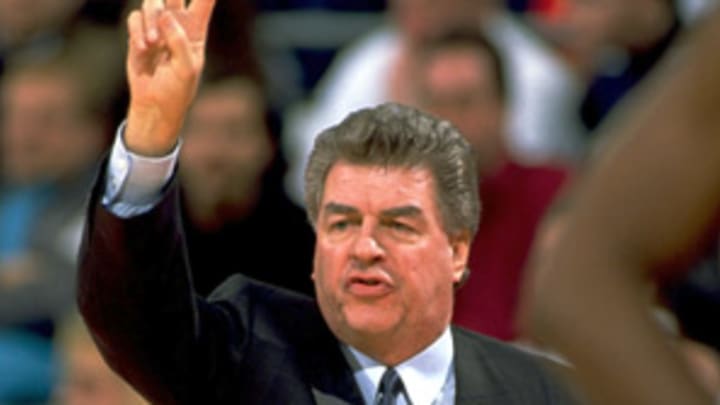Remembering Chuck Daly

Chuck offered a few strategic gems -- "See how Rasheed Wallace is shading over toward the paint when LeBron has the ball; Sheed's not even concerned with his man" -- but mostly we half-watched the game and half-talked about basketball. Chuck was the kind of guy who grew bored breaking down every play. He never presented himself as an X's and O's coach, one of those blackboard geniuses whose strategic acumen decided a game, even though he came out of that same station-to-station/summer camp tradition that produced those two great Browns, Hubie and Larry. Chuck could strategize with anybody -- he just didn't feel like doing it. He pretty much offered his philosophy about basketball with this: "One thing about those Detroit teams I coached," he said as we watched the Pistons shut down James, "was that we had pretty good personnel. You don't get too far without that."
I thought about that night -- and many others -- on Saturday when Chuck died from a cancer that started in his pancreas, was first diagnosed in his liver and finally moved to his stomach.
I thought about the times I would see him during the late 80s and early 90s when we would shake hands and he'd say, "Good to see you. Listen, you owe me any money?"
I thought about the time before a playoff game at the Palace of Auburn Hills, the air thick with tension, when Chuck leaned down to the press table and said to Dave Dupree of USA Today and myself, "See this gold stripe in my tie? It's the exact match of the pinstripe in my suit." It was his way of releasing tension, and saying that, yes, this seems like life and death but it really isn't. It was such moments that made covering the NBA during that era was one of the great assignments in sports.
I thought about afternoon in Monte Carlo when, during the Dream Team's 1992 Olympic preparation -- and I use the word preparation loosely -- I saw Chuck ambling through the hotel lobby on his way to the golf course with Michael Jordan. "Hey, it's not like I wanna play," Chuck said with a sly smile, "but you gotta keep your guys happy."
And I thought about that time in November of 2005 when Chuck came to speak at a scholarship banquet I helped organize. When I had told him how much we could afford to pay him, he said, "What? Are you kidding me?" Then he flew round-trip from Florida to Pennsylvania and did the gig for nothing.
The principal way to define a coach is by wins, losses and championships won, and by that metric, of course, Chuck (638-437 in 13 seasons. 75-51 in the postseason, two championships) was an overwhelming success. But I choose to define Chuck this way -- by the respect he earned from the smorgasbord of personalities over whom he held sway. With the possible exception of Phil Jackson -- and I say possible -- I can't think of any other coach who would've held together that rowdy band of Pistons (Isiah Thomas, Bill Laimbeer, Vinnie Johnson, Rick Mahorn, John Salley, Dennis Rodman, and Joe Dumars, the latter being the lone voice of sanity) better than Chuck. I can't think of any other coach who could've herded together that vast collection of Dream Team egos (Jordan, Magic Johnson, Larry Bird, Charles Barkley) and never got, as far as I heard, one word of criticism. After Chuck died, Matt Dobek, the Pistons public relations chief, was talking by phone with Larry Bird, who shared the Dream Team captaincy with Magic. "I loved that guy," Bird said of Chuck.
His genius was in giving players a lot of rope but always letting them know that someone was holding it at the other end. Chuck sweated only the big stuff, never the small stuff. Most of the obituaries will concentrate on his clothes, his hair and his good looks, all those things that contributed to that "Daddy Rich" nickname he picked up along the way.
"Nobody ever looks bad in a blue suit," he told me, and a thousand others. But in Chuck I always saw a guy who was at heart a high-school coach who happened to make it big, that rare someone with style and substance.
